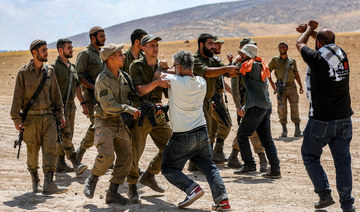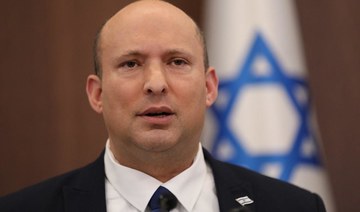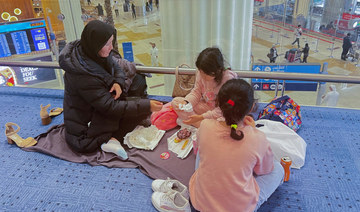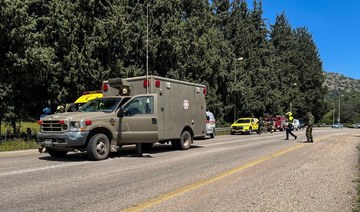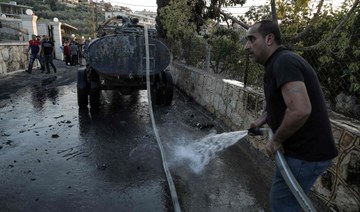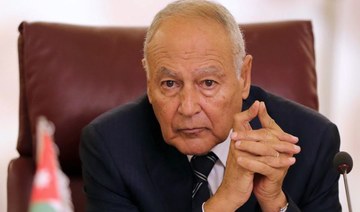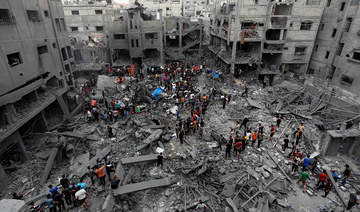JERUSALEM:Israeli lawmakers dissolved parliament on Thursday, forcing the country’s fifth election in less than four years, with Foreign Minister Yair Lapid set to take over as caretaker prime minister at midnight.
The final dissolution bill, which passed with 92 votes in favor none against, ends the year-long premiership of Naftali Bennett, who led an eight-party coalition that was backed by an Arab party, a first in Israeli history.
Following the vote, Lapid and Bennett immediately swapped seats in the parliament — the Knesset — and Lapid was embraced by members of his centrist Yesh Atid (There is a Future) party.
Bennett said late Wednesday that he will not stand in the upcoming election set for Nov. 1, which will see veteran right-wing opposition leader Benjamin Netanyahu attempt to reclaim power.
Netanyahu has promised that his alliance of right-wingers, ultra-nationalists and ultra-Orthodox Jewish parties will win the upcoming vote, but opinion polls show he may also struggle to rally a parliamentary majority.
Bennett will host Lapid for a handover ceremony later Thursday, the prime minister’s office said.
The outgoing premier will also hand the leadership of his religious nationalist Yamina party to his long-time political ally, Interior Minister Ayelet Shaked.
Netanyahu’s main challenger will likely be long-time foe Lapid, a former celebrity news anchor who has surprised many since being dismissed as a lightweight when he entered politics a decade ago.
Bennett’s motley alliance formed with Lapid in June 2021 offered a reprieve from an unprecedented era of political gridlock, ending Netanyahu’s record 12 consecutive years in power and passing Israel’s first state budget since 2018.
As pair announced plans to end their coalition last week, Lapid sought to cast Netanyahu’s potential return to office as a national threat.
“What we need to do today is go back to the concept of Israeli unity. Not to let dark forces tear us apart from within,” Lapid said.
Bennett led a coalition of right-wingers, centrists, doves and Islamists from the Raam faction, which made history by becoming the first Arab party to support an Israeli government since the Jewish state’s creation.
But the alliance, united by its desire to oust Netanyahu and break a damaging cycle of inconclusive elections, was imperilled from the outset by its ideological divides.
Bennett said the final straw was a failure to renew a measure that ensures the roughly 475,000 Jewish settlers in the occupied West Bank live under Israeli law.
Some Arab lawmakers in the coalition refused to back a bill they said marked a de facto endorsement of a 55-year occupation that has forced West Bank Palestinians to live under Israeli rule.
For Bennett, a staunch supporter of settlements, allowing the so-called West Bank law to expire was intolerable. Dissolving parliament before its June 30 expiration temporarily renews the measure.
In the weeks before his coalition unraveled, Bennett sought to highlight its successes, including what he characterised as proof that ideological rivals can govern together.
“No one should give up their positions, but it is certainly possible and necessary to put aside, for a while, ideological debates and take care of the economy, security and future of the citizens of Israel,” he said in his farewell address Wednesday, which did not rule out a eventual return to politics.
Bennett will stay on as alternate prime minister responsible for Iran policy, as world powers take steps to revive stalled talks on Tehran’s nuclear program.
Israel opposes a restoration of the 2015 agreement that gave Iran sanctions relief in exchange for limits on its nuclear program.
Lapid will retain his foreign minister title while serving as Israel’s 14th premier. He will find himself under an early microscope, with US President Joe Biden due in Jerusalem in two weeks.
Israel parliament dissolves itself, sets Nov. 1 election
https://arab.news/ywbpj
Israel parliament dissolves itself, sets Nov. 1 election
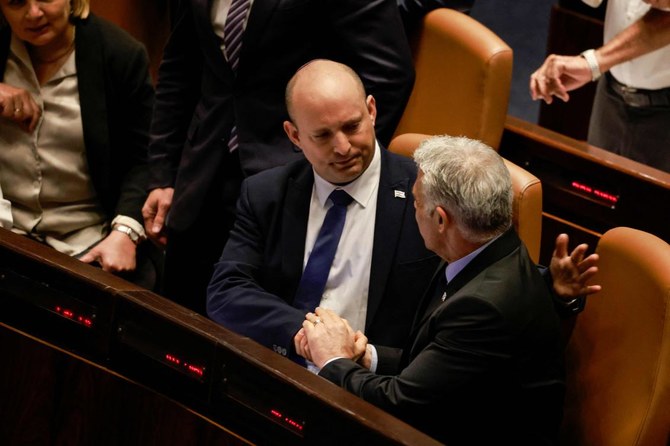
- The final dissolution bill ends year-long premiership of Naftali Bennett
- Bennett said he will not stand in the Nov. 1 election, which will see Benjamin Netanyahu attempt to reclaim power
Gazans search for remains after deadly Rafah strike

An Israeli strike hit the home where a displaced Palestinian family was sheltering in the southern city of Rafah, relatives and neighbors told AFP as they scraped at the soil with their hands.
Al-Arja said the blast killed at least 10 people.
“We retrieved the remains of children and women, finding arms and feet. They were all torn to pieces.
“This is horrifying. It’s not normal,” he said, hauling concrete and broken olive branches from the wreckage. “The entire world is complicit.”
Soon after the war began on Oct. 7, Israel told Palestinians living in the north of Gaza to move to “safe zones” in the territory’s south, like Rafah.
But Israeli Prime Minister Benjamin Netanyahu has since vowed to invade the city, where around 1.5 million people live in shelters, more than half the territory’s population.
“How is Rafah a safe place?” said Zeyad Ayyad, a relative of the victims. He sighed as he cradled a fragment of the remains.
“I heard the bombing last night and then went back to sleep. I did not think it hit my aunt’s house.”
The search for remains was long and painful. The strike left a huge crater and children picked through the rubble while neighbors removed debris, tarpaulin, a pink top.
“We can see them under the rubble and we’re unable to retrieve them,” Al-Arja said.
“These are people who came from the north because it was said the south is safe.”
“They struck without any warning,” he said.
In a separate strike on the house in Rafah’s Al-Salam neighborhood overnight on Tuesday, rescue crews recovered the corpses of eight family members, including five children and two women, Gaza’s civil defense service said.
“An Israeli rocket hit a house of displaced people,” said resident Sami Nyrab.
“My sister’s son-in-law, her daughter, and her children were having dinner when an Israeli missile demolished their house over their heads.”
Dubai clears up after epic rains swamp glitzy city
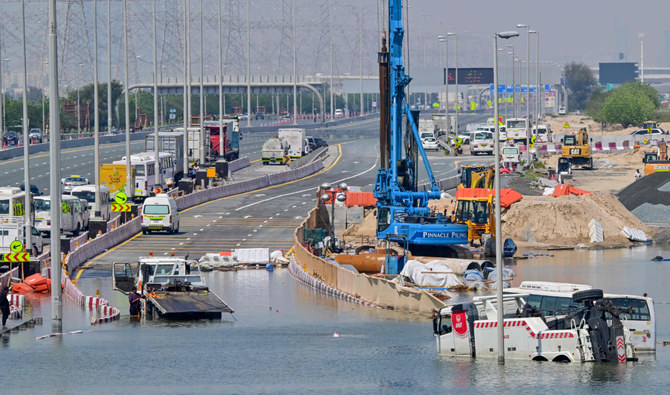
- The rains were the heaviest experienced by the UAE in the 75 years that records have been kept
DUBAI: Dubai was busy on Thursday clearing its waterlogged roads and drying out flooded homes two days after a record storm deposited a year’s worth of rainfall in a day.
Dubai International Airport, a major travel hub, struggled to clear a backlog of flights, and many roads were still flooded in the aftermath of Tuesday’s deluge.
The rains were the heaviest experienced by the UAE in the 75 years that records have been kept.
They brought much of the country to a standstill and caused significant damage.
Flooding trapped residents in traffic, offices, and homes.
Many reported leaks at their homes, while footage circulated on social media showed malls overrun with water pouring from roofs.
Traffic remained heavily disrupted.
A highway through Dubai was reduced to a single lane in one direction, while the main road connecting Dubai with Abu Dhabi was closed in the Abu Dhabi direction.
“This was like nothing else. It was like an alien invasion,” said Jonathan Richards, a Dubai resident from Britain.
“I woke up the other morning to people in kayaks, pet dogs, pet cats, and suitcases outside my house.”
Another resident, Rinku Makhecha, said the rain swamped her newly renovated house, which she moved into two weeks ago.
“My entire living room is just like ... all my furniture is floating right now,” she said.
In Dubai’s streets, some vehicles, including buses, could be seen almost entirely submerged in water.
Long queues formed at petrol stations.
Dubai Airport had not resumed normal operation after the storm flooded taxiways, forcing flight diversions, delays, and cancellations.
Dubai Airport Chief Operating Officer Majed Al Joker told Al Arabiya TV he expected Dubai International Airport to reach 60 to 70 percent capacity by the end of Thursday and full operational capacity within 24 hours.
The airport struggled to get food to stranded passengers, with nearby roads flooded and overcrowding limited access to those who had confirmed bookings.
While some roadways into hard-hit communities remain flooded, delivery services across Dubai, whose residents are used to ordering everything at the click of a mouse, slowly began returning to the streets.
Following Tuesday’s events, questions were raised about whether cloud seeding, a process that the UAE frequently conducts, could have caused the heavy rains.
A UAE government agency overseeing cloud seeding — manipulating clouds to increase rainfall — denied conducting such operations before the storm.
President Sheikh Mohammed bin Zayed Al-Nahyan said in a statement that he had ordered authorities to assess the damage and support families impacted by the storm.
Dubai’s Crown Prince Sheikh Hamdan bin Rashid Al-Maktoum said on X that the safety of citizens, residents, and visitors was the utmost priority.
“At a meeting with government officials in Dubai, we set directives to prepare comprehensive plans in response to natural crises such as the unexpected current weather conditions,” he said.
Hezbollah says 2 fighters killed in Israeli strikes
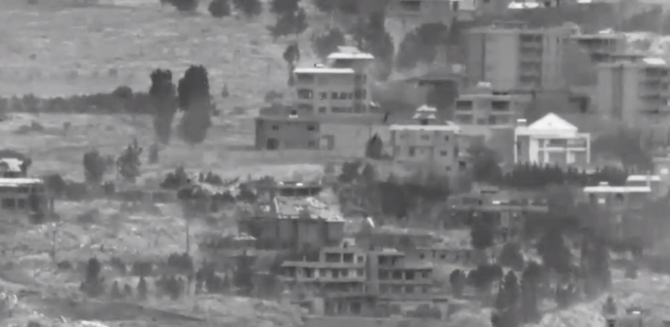
- GPS interference affecting both sides of Lebanese border, source says
BEIRUT: Two Hezbollah fighters were killed on Wednesday as Israel intensified strikes on south Lebanon following an attack by the Iran-backed group that wounded 14 Israeli soldiers.
Israel and Hezbollah have exchanged near-daily cross-border fire since Palestinian militant group Hamas attacked southern Israel on Oct. 7, triggering war in the Gaza Strip.
A security source said: “Hezbollah’s complex attack against the Israeli army in Wadi Al-Aramshe early on Wednesday, which led to the injury of 14 Israeli soldiers, including six with serious injuries, was absorbed by the Israeli side after the painful blow it directed at the party by assassinating three of its field officials.”
The Israeli army responded to the Wadi Al-Aramshe operation on Wednesday night by targeting the town of Iaat in the Bekaa Valley, 5 km from Baalbek. A drone strike hit a warehouse belonging to a member of the Al-Zein family, resulting in light wounds to one civilian.
Israel continues to jam GPS around the Lebanese southern border region, especially during military operations.
A security source said: “This interference negatively affects both the Israeli army and Hezbollah in targeting objectives.”
Hezbollah announced a series of operations since dawn on Thursday, targeting Israeli military sites opposite the Lebanese border.
The group targeted an Israeli force attempting to withdraw a military vehicle that was targeted on Wednesday at Metula, opposite the Lebanese town of Kfarkela.
At dawn, Israeli soldiers in Al-Malikiyah, opposite the Lebanese town of Aitaroun, were targeted by Hezbollah using missiles.
The group also targeted Israeli soldiers in Al-Marj.
“After careful monitoring and anticipation of the enemy’s movement at Al-Marj … they were targeted with missile weapons and suffered a direct hit; some died while others were injured,” the group said in a statement.
Hezbollah attacked Israeli soldiers using missiles in the Hanita forest, opposite the Lebanese town of Alma Al-Shaab.
On Thursday, the party mourned two members killed in Wednesday night’s shelling of Kfarkela. Mohammed Jamil Al-Shami from Kfarkela and Ali Ahmed Hamadeh from Doueir were killed in the Israeli operation.
The Israeli army targeted Lebanese towns with heavy shelling until dawn on Thursday. The town of Khiam was a priority target; correspondents in the area counted seven strikes and 128 artillery and phosphorous shells impacting between 8 p.m. and 4 a.m.
A young man from Habboush, Ahmed Hassan Al-Ahmed, was killed in the shelling and mourned by residents of his town.
Jets struck Hezbollah targets in Khiam, including infrastructure and two military buildings, the Israeli army said.
Israeli drones targeted a house on the outskirts of Markaba and in Blida on Thursday, with casualties reported.
The Israeli army also targeted Kfarkela with two missiles from a drone, and with artillery and phosphorous shells. From Metula opposite the border, Israeli soldiers combed the town with heavy machine guns.
The outskirts of Dhayra, Al-Bustan and Aita Al-Shaab were hit by gunfire from the Israeli position in Birkat Risha and other positions adjacent to the Blue Line.
German airline Lufthansa announced on Thursday it had extended the suspension of flights to Beirut and Tehran until April 30.
The decision was taken on the night of the Iranian attack on Israel last weekend.
UNIFIL spokesman Andrea Tenenti said that the organization’s peacekeepers “remain in their positions and carry out their duties, as well as our civilian staff.”
He added: “The safety and security of UN staff and their families are our priority.”
Dubai clears up after epic rains swamp glitzy desert city
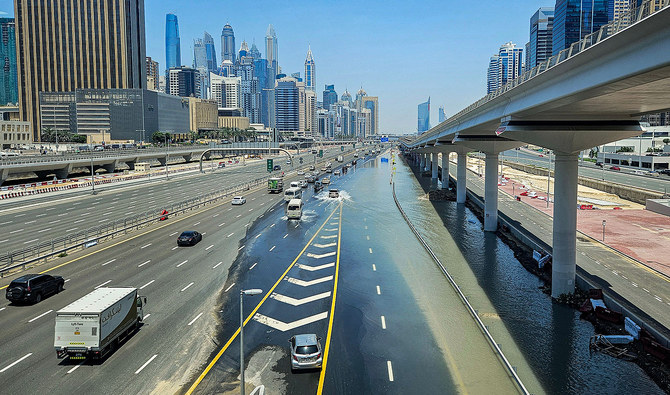
- Rains were the heaviest experienced by the United Arab Emirates in the 75 years that records have been kept
- Flooding trapped residents in traffic, offices and homes, houses’ roofs leaked and malls were overrun with water
DUBAI: Dubai, a city in the desert proud of its futuristic gloss, was on Thursday busy clearing its waterclogged roads and drying out flooded homes two days after a record storm saw a year’s rain fall in a day.
Dubai International Airport, a major travel hub, struggled to clear a backlog of flights and many roads were still flooded in the aftermath of Tuesday’s deluge.
The rains were the heaviest experienced by the United Arab Emirates in the 75 years that records have been kept. They brought much of the country to a standstill and caused significant damage.
Flooding trapped residents in traffic, offices and homes. Many reported leaks at their homes, while footage circulated on social media showed malls overrun with water pouring from roofs.
Traffic remained heavily disrupted. A highway through Dubai was reduced to a single lane in one direction, while the main road that connects Dubai with the capital Abu Dhabi was closed in the Abu Dhabi direction.
“This was like nothing else. It was like an alien invasion,” Jonathan Richards, a Dubai resident from Britain told Reuters.
“I woke up the other morning to people in kayaks with pet dogs, pet cats, suitcases all outside my house.”
Another resident, Rinku Makhecha, said the rain swamped her freshly renovated house she moved into two weeks ago.
“My entire living room is just like ... all my furniture is floating right now,” she said.
In Dubai’s streets, some vehicles, including buses, could be seen almost entirely submerged in water. Long queues formed at petrol stations.
Dubai airport had yet to resume normal operation after the storm flooded taxiways, forcing flight diversions, delays and cancelations.
Dubai Airports Chief Operating Officer Majed Al Joker told Al Arabiya TV he expected Dubai International Airport to reach 60-70 percent capacity by the end of Thursday and full operational capacity within 24 hours.
The airport struggled to get food to stranded passengers with nearby roads flooded and overcrowding limited access to those who had confirmed bookings.
RETURNING SUPPLIES
The storm, which hit neighboring Oman on Sunday, pounded the UAE on Tuesday, with 20 reported dead in Oman and one in the UAE.
While some roadways into hard-hit communities remain flooded, delivery services across Dubai, whose residents are used to ordering everything at the click of a mouse, slowly began returning to the streets.
Rains are rare in the UAE and elsewhere on the Arabian Peninsula, which is typically known for its dry desert climate. Summer air temperatures can soar above 50 degrees Celsius.
Following Tuesday’s events, questions were raised whether cloud seeding, a process that the UAE frequently conducts, could have caused the heavy rains.
But climate experts blame global warming for such extreme weather events.
Researchers anticipate that climate change will lead to heightened temperatures, increased humidity and a greater risk of flooding in parts of the Gulf region. Countries like the UAE where there is a lack of drainage infrastructure to cope with heavy rains can suffer the most.
A UAE government agency that oversees cloud seeding — a process of manipulating clouds to increase rainfall — denied conducting any such operations before the storm.
President Sheikh Mohammed bin Zayed Al Nahyan said in a statement he had ordered authorities to assess the damage and provide support to families impacted by the storm.
Dubai’s Crown Prince Sheikh Hamdan bin Rashid Al Maktoum said on X that the safety of citizens, residents and visitors was the utmost priority.
“At a meeting with government officials in Dubai, we set directives to prepare comprehensive plans in response to natural crises’ such as the unexpected current weather conditions,” he said.
Arab League chief voices Gaza fears in talks with UN official
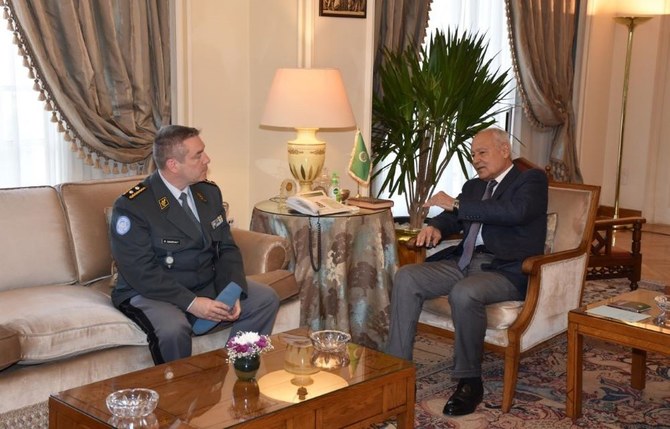
- Secretary-General Ahmed Aboul Gheit met with the UN’s Maj. Gen. Patrick Gauchat
- UNTSO chief briefed the secretary-general on conflicts in several areas monitored by the UN
CAIRO: Arab League Secretary-General Ahmed Aboul Gheit has told a senior UN official that he fears the conflict in Gaza could spiral out control and threaten regional security.
In a meeting in Cairo with Maj. Gen. Patrick Gauchat, head of mission and chief of staff of the UN Truce Supervision Organization, Aboul Gheit highlighted the need to implement the UN Security Council’s ceasefire resolution, and provide urgent humanitarian aid to the famine-stricken population in Gaza.
Gamal Roshdy, a spokesperson for the Arab League chief, said that the meeting discussed the regional situation, with Aboul Gheit saying that Israel’s war on Gaza violated international law and humanitarian principles.
The UNTSO chief briefed the secretary-general on conflicts in several areas monitored by the UN, including the Blue Line, which delineates the truce between Lebanon and Israel.
Aboul Gheit said that political resolutions remain the most effective means to ensure security for all parties.
However, achieving such resolutions remains challenging while Israel pursue its objectives through military force and by targeting civilians, he said.
According to the UNTSO website, the Security Council, in Resolution 50 (1948), called for a cessation of hostilities in Palestine on May 29, 1948, and decided that the UN Mediator should supervise the truce with the assistance of a group of military observers.
The first group of military observers, established in 1949 to supervise the implementation of the Israel-Arab Armistice Agreements, became known as the UN Truce Supervision Organization.
UNTSO observers in the Middle East to monitor ceasefires, supervise armistice agreements, prevent isolated incidents from escalating, and assist other UN peacekeeping operations in the region.



